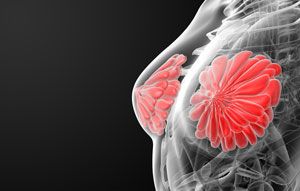Genetic Variant May Reduce Risk of Breast Cancer in Latinas
New research has identified a genetic variant that helps reduce the risk of breast cancer in some Latina patients by 40% to 80%.
New research has identified a genetic variant that helps reduce the risk of breast cancer in some Latina patients by 40% to 80%.

New research has identified a genetic variant that helps reduce the risk of breast cancer in some Latina patients by 40% to 80%.
The research, published inNature Communicationsand conducted by researchers at University of California, San Francisco, showed that the variant, a difference in just one of the three billion “letters” in the human genome known as a single-nucleotide polymorphism (SNP), originates from indigenous Americans and confers significant protection from breast cancer. This protection is particulary significant in the more aggressive estrogen receptornegative forms of the disease, which generally have a worse prognosis.
“The effect is quite significant,” Elad Ziv, MD, professor of medicine at UCSF and senior author of the study, said in a statement. “If you have one copy of this variant, which is the case for approximately 20% of US Latinas, you are about 40% less likely to have breast cancer. If you have two copies, which occurs in approximately 1% of the US Latina population, the reduction in risk is on the order of 80%.”
Epidemiological data have long demonstrated that Latina women are less susceptible to breast cancer than women of other ethnicities. According to National Cancer Institute data from 2007 to 2009, whites have about a 13% lifetime risk of breast cancer, blacks about 11%, and Hispanics less than 10%. The lifetime risk among Hispanics with indigenous American ancestry is even lower.
The researchers performed successive genome-wide association analyses of datasets from the Cancer Prevention Institute of California (CPIC) and a study known as the Multiethnic Cohort. They replicated their initial findings in data from the Women’s Health Initiative study, from a study of breast cancer in Colombian women known as COLUMBUS, and from a study conducted in Mexico, ultimately incorporating DNA data from a total of 3140 women with breast cancer and 8184 healthy controls.
The newly discovered SNP is on chromosome 6, near a gene coding for an estrogen receptor known as ESR1. While the biological basis of the association between the variant and reduced breast cancer risk is still not known, preliminary experiments indicate that the variant interferes with the action of transcription factors, proteins that regulate the expression of the ESR1 estrogen receptor.
The study also found that women who carry the variant have breast tissue that appears less dense on mammograms. Previous research has shown that high mammographic density is a risk factor for breast cancer.
“We have detected something that is definitely relevant to the health of Latinas, who represent a large percentage of the population in California, and of other states such as Texas,” first author Laura Fejerman, PhD, assistant professor of medicine and a member of UCSF’s Institute of Human Genetics, said in a statement. “This work was done as a collaboration of multiple investigators, many of us originally from Latin America. As a Latina myself, I am gratified that there are representatives of that population directly involved in research that concerns them.”
“If we can use these results to better understand how this protects estrogen receptor-negative breast cancer, that would be interesting and important,” Ziv said, “because right now we have no good way to prevent that type of breast cancer.”